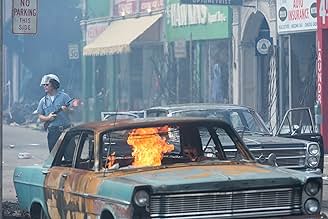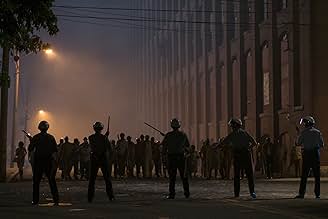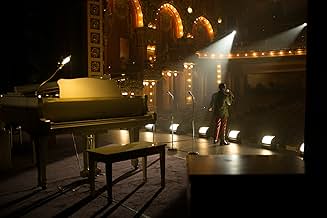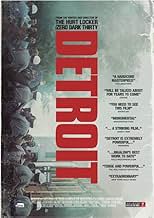Fact-based drama set during the 1967 Detroit riots in which a group of rogue police officers respond to a complaint with retribution rather than justice on their minds.Fact-based drama set during the 1967 Detroit riots in which a group of rogue police officers respond to a complaint with retribution rather than justice on their minds.Fact-based drama set during the 1967 Detroit riots in which a group of rogue police officers respond to a complaint with retribution rather than justice on their minds.
- Awards
- 5 wins & 21 nominations total
Joshua Olumide
- Dave
- (as Tokunbo Joshua Olumide)
- Director
- Writer
- All cast & crew
- Production, box office & more at IMDbPro
Featured reviews
As the first film to be distributed and released by Annapurna, Detroit tells the story about what happened during the 1967 riots, specifically the one in Detroit that put the city on the map and drove the population down from its highs back when Detroit was the Motor City. The acting, direction, music, and pace of this movie is well done and should've gotten Oscar love.
Director Katheryn Bigelow does a wonderful job of creating a great deal of tension. She does so by cutting from one tightly framed slightly wobbly shot to the next. Each character's face floods nearly the entire screen after each of these cuts. This makes the movie deeply personal and almost claustrophobic at times. The slight wobbles of the camera as it focuses on a face, adds to the uneasiness and unstable nature of the situation.
What I'm saying is the movie is expertly directed. That's evident early on and remains that way throughout. The issue holding this movie back from becoming one of serious best picture caliber is the writing. The story felt a bit underdeveloped.
The brief on-screen text explanation of the tension between the Detroit Police and the city's black residents could have served as a helpful addition to a setup that followed in the movie. I would have had no problem with that. But after the movie plays for 20 minutes or so, I realized that the text was the sole source of setup.
That's a classic case of telling instead of showing. Movies are a video medium. Use that. Don't casually display the text on screen. This choice may have been made for the sake of time, but I think the filmmakers would have been wise to focus more on the setup aspect. The text explanation felt like an inconsiderate means of storytelling.
After the opening text, the movie meanders for a while, eventually introducing the key characters and providing an appetizer of their personalities, foreshadowing their upcoming behavior.
Moments like these showcased strengths in the writing. The writing did not completely ruin the movie; it simply was not an Oscar-contending performance, like Bigelow's work.
The movie overall is well made, thanks in large part to Bigelow's deft direction, but it's not without flaws. One that I already mentioned is that I wanted the actual movie (not solely text) to better set the stage of this city that's on the verge of riot.
The second criticism ties into the first. Because of the lack of stage setting, this becomes a movie that expertly depicts the what, but fails to fully deliver on the why.
I see the riots. I see the emotional toll that police misconduct had on the abused citizens. I see the guilt that certain uniformed personnel felt for standing by and allowing the abuse to take place. What I didn't see enough of is why all this happened. I wanted a more personal detailing of what led up to the night shown in the movie. The actions are clear and powerful, but the motivations are vague and weak.
I came away from the movie wondering what message the filmmakers hoped to convey. While the title is Detroit, the story has a much narrower focus. Were the clear majority of Detroit City Police Officers upstanding in their behavior, with only a few tragic bad apples? Given the choice focus on only a few officers and a select group of citizens, should I assume that these officers' misconduct was the norm or the exception?
Perhaps it was not the filmmakers' intent to answer these questions. Maybe they only wanted to tell this specific story, without greater implications, which is fine. I just personally wanted to see a broader depiction of the city's atmosphere leading up to, during, and following the riots.
What I'm saying is the movie is expertly directed. That's evident early on and remains that way throughout. The issue holding this movie back from becoming one of serious best picture caliber is the writing. The story felt a bit underdeveloped.
The brief on-screen text explanation of the tension between the Detroit Police and the city's black residents could have served as a helpful addition to a setup that followed in the movie. I would have had no problem with that. But after the movie plays for 20 minutes or so, I realized that the text was the sole source of setup.
That's a classic case of telling instead of showing. Movies are a video medium. Use that. Don't casually display the text on screen. This choice may have been made for the sake of time, but I think the filmmakers would have been wise to focus more on the setup aspect. The text explanation felt like an inconsiderate means of storytelling.
After the opening text, the movie meanders for a while, eventually introducing the key characters and providing an appetizer of their personalities, foreshadowing their upcoming behavior.
Moments like these showcased strengths in the writing. The writing did not completely ruin the movie; it simply was not an Oscar-contending performance, like Bigelow's work.
The movie overall is well made, thanks in large part to Bigelow's deft direction, but it's not without flaws. One that I already mentioned is that I wanted the actual movie (not solely text) to better set the stage of this city that's on the verge of riot.
The second criticism ties into the first. Because of the lack of stage setting, this becomes a movie that expertly depicts the what, but fails to fully deliver on the why.
I see the riots. I see the emotional toll that police misconduct had on the abused citizens. I see the guilt that certain uniformed personnel felt for standing by and allowing the abuse to take place. What I didn't see enough of is why all this happened. I wanted a more personal detailing of what led up to the night shown in the movie. The actions are clear and powerful, but the motivations are vague and weak.
I came away from the movie wondering what message the filmmakers hoped to convey. While the title is Detroit, the story has a much narrower focus. Were the clear majority of Detroit City Police Officers upstanding in their behavior, with only a few tragic bad apples? Given the choice focus on only a few officers and a select group of citizens, should I assume that these officers' misconduct was the norm or the exception?
Perhaps it was not the filmmakers' intent to answer these questions. Maybe they only wanted to tell this specific story, without greater implications, which is fine. I just personally wanted to see a broader depiction of the city's atmosphere leading up to, during, and following the riots.
Detroit is the latest addition to Kathryn Bigelow's lengthy filmography and it is the most Bigelow-esque film you'd come to expect from her. The film displays raw realism with the actors looking very real and naked from their famous personas. The story is jam packed and while I think this source material would have made a much better miniseries, Bigelow makes the story work with sacrificing some facts for the sake of cinema. The big question is: is it as good as the critics say it is? The answer: No. Not Close. But with that being said, it is a damn good movie that is definitely worth seeing.
Telling the story of three murdered African American men in a motel in Detroit during the city's infamous riots and civil rights movement, Detroit stars an all star cast that is certainly better on paper than they are in this film. John Boyega, Will Poulter, Jason Mitchell, Anthony Mackie, John Krasinski, and on and on-but none of them are really served as a main character. Bigelow is so determined on telling the facts of the case that she sacrifices good performances in order to give us a slice of reality. The film plays out like the most expensive reenactment of a tragedy on Investigation Discovery and, when looking at the facts of the case, this is the best compliment I can give the film. It sounds back handed but it is extremely informative even if it is picking a side in all of it. The one thing Bigelow does best is showing a true story like it is unfolding in front of you. She does it brilliantly in The Hurt Locker and Zero Dark Thirty, but Detroit is where it is to a fault.
With a 140-plus minute running time and a gaggle of characters to keep track of, the story is just too big for a feature film and requires patience. Despite this, Kathryn Bigelow does her best to tame Mark Boal's bloated script to a digestible film and the results are mostly good. The performances from the actors are real, raw and authentic in every aspect but never enough to burst off the screen. Bigelow lets the events unfold and do that for them. Overall, Detroit is certainly a good film in need of an audience just a very patient one.
Telling the story of three murdered African American men in a motel in Detroit during the city's infamous riots and civil rights movement, Detroit stars an all star cast that is certainly better on paper than they are in this film. John Boyega, Will Poulter, Jason Mitchell, Anthony Mackie, John Krasinski, and on and on-but none of them are really served as a main character. Bigelow is so determined on telling the facts of the case that she sacrifices good performances in order to give us a slice of reality. The film plays out like the most expensive reenactment of a tragedy on Investigation Discovery and, when looking at the facts of the case, this is the best compliment I can give the film. It sounds back handed but it is extremely informative even if it is picking a side in all of it. The one thing Bigelow does best is showing a true story like it is unfolding in front of you. She does it brilliantly in The Hurt Locker and Zero Dark Thirty, but Detroit is where it is to a fault.
With a 140-plus minute running time and a gaggle of characters to keep track of, the story is just too big for a feature film and requires patience. Despite this, Kathryn Bigelow does her best to tame Mark Boal's bloated script to a digestible film and the results are mostly good. The performances from the actors are real, raw and authentic in every aspect but never enough to burst off the screen. Bigelow lets the events unfold and do that for them. Overall, Detroit is certainly a good film in need of an audience just a very patient one.
This movie has a very intense pace. It's a story who had to be told and I believe that Directress Bigelow does it very well. In every frame there is something interesting going on and some kind of challenge. This gives a special feeling of how terrible things were at the time. I just have some trouble with the characters depth because it never really fleshes out the characters. Also some characters appear in a certain cliché way. You care and feel for them through the visual atrocities and because of the rejection of racism but not because you like the character on an emotional level. If you want to see a movie with a point of view and want to be emotionally moved then this is for you.
This film tells the story of a night going desperately wrong in Detroit.
I knew the film would be disturbing, so I have put off watching it. And it is really disturbing. I feel so so sorry for the residents of the hotel. No one deserves to be treated like this. This film shows me just how it is to be an ethnic minority in Detroit at the time. The injustice is just shocking. I sympathise with the victims, and really wish that justice could prevail.
I knew the film would be disturbing, so I have put off watching it. And it is really disturbing. I feel so so sorry for the residents of the hotel. No one deserves to be treated like this. This film shows me just how it is to be an ethnic minority in Detroit at the time. The injustice is just shocking. I sympathise with the victims, and really wish that justice could prevail.
Did you know
- TriviaUsing a style she first adopted with Démineurs (2008), director Kathryn Bigelow deployed three or four cameras at a time, keeping them in constant motion around the actors. Bigelow preferred to light the entire set to give the performers more flexibility to move around. She didn't block a scene for the camera by plotting out a series of close-ups and wide shots, instead filming everything in a few takes to keep the emotions as raw as possible. "After two or three takes, I have it," she said.
- GoofsThe telephones in the hotel rooms and elsewhere have handsets with modular connectors and flexible cords. Phones like that weren't available nationwide until the 1970s, but they were available in Detroit in 1961.
- Crazy creditsBefore end credits: "The facts around the murders at the Algiers Motel on July 25th, 1967 were never conclusively established in a criminal proceeding. As a result, portions of this film were constructed and dramatized based on the recollections of the participants and available documents."
- Soundtracks(I Know) I'm Losing You
Written by Cornelius Grant, Eddie Holland (as Edward Holland Jr.) and Norman Whitfield
Performed by The Temptations
Courtesy of Motown Records
Under license from Universal Music Enteprises
- How long is Detroit?Powered by Alexa
Details
- Release date
- Country of origin
- Official sites
- Language
- Also known as
- Detroit: Zona de conflicto
- Filming locations
- Detroit, Michigan, USA(Detroit Police Station 10th Precinct)
- Production companies
- See more company credits at IMDbPro
Box office
- Budget
- $34,000,000 (estimated)
- Gross US & Canada
- $16,790,139
- Opening weekend US & Canada
- $350,190
- Jul 30, 2017
- Gross worldwide
- $23,355,100
- Runtime
- 2h 23m(143 min)
- Color
- Sound mix
- Aspect ratio
- 1.85 : 1
Contribute to this page
Suggest an edit or add missing content








































